
views
Choosing the Time and the Setting

Choose the right beach. If there is a particular foreign or faraway beach that strikes your fancy, you can plan a destination wedding. Be aware, however, that attending this type of wedding may be inconvenient and expensive for your guests.If you live near the beach, consider having your wedding close to home. Your guests will appreciate the convenience and lower cost, and you will probably have a bigger turnout for your event. Local beach wedding. If you live near a coast, this is the simplest type of beach wedding. You can plan the wedding on your own, or hire a wedding planner. Resort destination wedding. Resorts like Sandals or Dreams will usually help you plan a simple or an elaborate wedding. Professional destination wedding. These can be held in the U.S. or in your favorite vacation destination. You will need to hire a professional wedding planner. It's usually a good idea to find a planner who is local to the area you plan to hold your wedding. Public U.S. beach. You can usually hold a wedding ceremony on any American beach, as long as you check with the local authorities and procure any necessary permits. Private U.S. beach. For a smaller wedding of 50 or fewer guests, you may be able to find a private homeowner who will let you use their personal beach. Try checking Airbnb to see if there are any hosts in your chosen area who will rent you their beach.

Choose the time of day for your wedding. If you hold your wedding during the day, the water will make a beautiful backdrop for the couple. If you plan an evening wedding, you probably won't be able to see much of the sea. Some beaches can get very hot during the middle of the day, which won't be comfortable for you or your guests. Try planning your ceremony at a cooler time of day, like the morning or late afternoon.

Plan for bad weather. Any time you plan an outdoor event, you should come up with a contingency plan in the event of rain or high winds. If you choose a resort hotel, try to reserve a meeting room in advance, in case you need to use it. If you had planned to have the wedding on the beach and the reception at home, you may need to hold the ceremony in your house, as well. Rent a tent. If the weather is windy, but not dangerous, you could set up the altar, walkway, and guest seating under a large temporary tent. Many companies rent tents for this purpose. EXPERT TIP Jenny Yi Jenny Yi Professional Wedding Planner Jenny Yi is the Founder of Chloe+Mint, an award-winning full service event planning company that specializes in wedding planning, design and floral design. Jenny has been in the industry for over 5 years, and also works closely with notable brands and celebrities on branding and events. Jenny Yi Jenny Yi Professional Wedding Planner Make a plan, then let go of stress. Professional event planner Jenny Yi says: "You can never completely plan for bad weather, so it's important to have a contingency plan in place. Decide whether you want to have a tent or a secondary location in case of bad weather, then don't worry about it until about 10 days before the wedding. At that point, you can start looking at the forecast and you can decide whether you need to start preparing for that."

Make it private. If you are holding your wedding at a beach resort, ask the manager if the beach will be reserved for you alone. If not, you may be able to pay extra to have the beach all to yourself for the length of the ceremony. Lack of privacy is one of the downsides to having your wedding in a public venue. If you are only able to rent a portion of the beach, try creating privacy by erecting screens on both sides of the ceremony site. Stick tall bamboo poles in the sand and string fine wire or clothesline between them. Drape sheer white fabric over the clothesline or wire. If you will be renting a large tent, this will create some privacy as well. Arrange the outdoor altar and guest chairs so that the tent is between the ceremony area and the public area.

Choose a color scheme. If you don't already have a favorite color scheme in mind, consider a color palette that is currently in style. Pale colors often work best for beach weddings, but you can choose any color scheme you like. Stark black and white can be very dramatic, but dark colors will be uncomfortable in the heat. Currently, the most popular colors for bridesmaids dresses (in general) are: mint green, coral, emerald green, bright purple, pale pink, pale beige, dark blue, black, white, and grey. Teal, purple, and green works well for an evening wedding by the sea. Silver, ivory, and beige create an elegant effect. Coral, fuchsia, and navy are great for a nautical theme. Sea glass blue with ivory and green can work for a formal or an informal beach wedding. Marigold (orange), gold and white is a great color scheme for late summer beach weddings. Canary yellow with tangerine and peach creates a vivid, colorful look for an outdoor wedding.
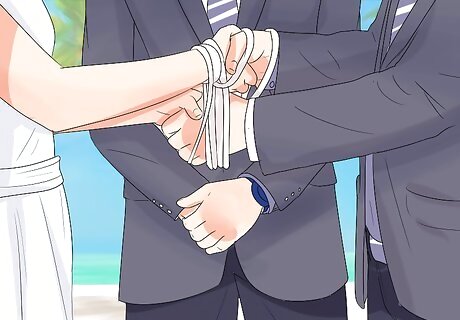
Choose a unity ceremony. A unity candle is a traditional approach, but outdoor weddings can cause breezes that blow out the candle flame before the ceremony is complete. There are many options for a beach wedding. A unity candle is a large candle with multiple wicks, that is lit by the bride and groom (and sometimes by the couple's children, as well). A sand ceremony is appropriate for a beach wedding. Find a beautiful vase or canister, and have the bride and groom contribute a handful of sand as a symbol of their commitment. It's best to avoid glass containers at a beach wedding, as unexpected gusts of wind can topple and break them. A handfasting ceremony is a romantic way to symbolically join together husband and wife. The ceremony officiant or an older relative can give a short speech while the bride and groom hold hands. They will then loosely wrap a beautiful silk cloth or ribbon around the couple's wrists.

Choose hardy flowers. Certain types of flowers are more likely to wilt and droop, and won't hold up for the length of your wedding ceremony. Be sure to tell your florist or wedding planner that you will be having a beach wedding, so you can select flowers appropriate to the occasion. Flowers that wilt easily include: freesia, bour varia, and poppies. Flowers that do well in the sun include: plumeria, chrysanthemums, and orchids.
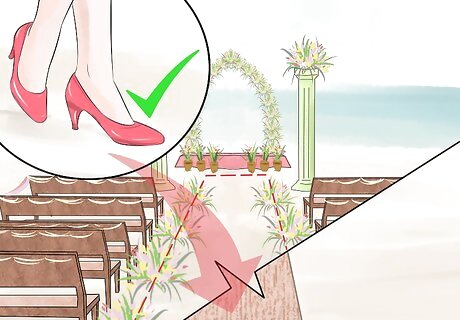
Build a hidden walkway, if you plan to wear heels. If you can't imagine your wedding without a stunning gown and impractical high heels, consider creating a simple walkway that leads to the altar. Buy sections of plywood at a hardware store, and arrange them to make a path down the aisle. Cover the walkway with sand, so the guests won't be able to see it.
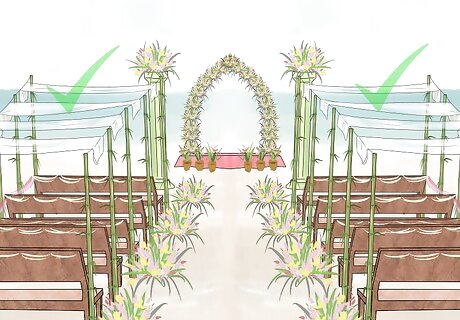
Shade the whole area. When arranging the seating, be sure to include some kind of shade for your guests. You could rent a tarp for this purpose. You could also poke bamboo poles into the sand and drape a light-weight white fabric over them to create a beautiful canopy.
Designing Your Beach Bridal Look
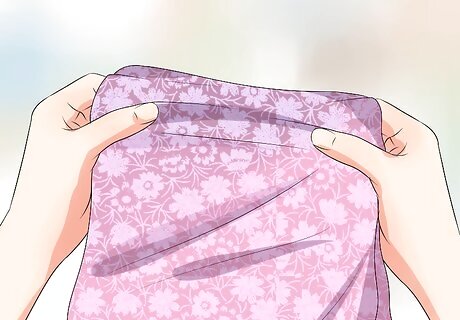
Choose the right silhouette for the bridal gown. A huge, flouncy, complicated wedding gown can be extremely heavy and could even cause heat stroke if the weather is warm enough. A simple gown of a light material is best, and it will be easier to keep it clean and out of the sand. A column dress is a simple sheath that can be worn in many lengths, from full length to above the knee. These can be fitted loosely, to skim the body (best for larger figures), or snugly, to hug the body (best for tall, narrow figures). An A-line gown is shaped like an inverted V, and is flattering for all figures. A gown with simple, uncluttered lines is best for a beach wedding. A sleeveless gown with open shoulders is a good choice for beach temperatures. A halter top neckline is very appropriate for a less formal beach wedding. Beach weddings are the perfect time to try a casual, bohemian dress in a short or maxi length. Try an unstructured babydoll silhouette, or a layered look with a crocheted top layer that shows a glimpse of skin.

Choose an appropriate material for the bridal gown. Heavy materials like brocade, jacquard, or velvet will be very uncomfortable at a beach wedding. Choose a lighter fabric that allows air to circulate, which will keep the bride from overheating or perspiring on her big day. If you like structured fabrics, try organza, or its slightly sturdier cousin gather. Other good formal choices are shantung (a nubby, raw silk) or taffeta (a crisp, elegant material that rustles when it moves). For a soft look, try chiffon (a transparent fabric usually used for sleeves and outer layers), georgette (a heavier version of chiffon), silk crepe, or lace. Jersey is a stretch material that travels well because it does not crease easily. It tends to be very form-fitting. Tulle can give you a lovely “ballerina” look, especially in a lovely tea length that would be convenient to wear on the beach.

Skip the veil. A long veil can be difficult to manage if it is windy on your special day. Unless you really need to wear a veil, try a fascinator or an arrangement of fresh, cut flowers in your hair.

Try an updo. For a beach wedding, you will want your hair to cooperate and to look good for as long as possible. If it's very windy out, long hair or complicated styles might not last very long. Ask your stylist to arrange your hair in a tight, stylish updo that won't come undone in the wind. You could leave a few tendrils of hair loose, to soften the overall effect.
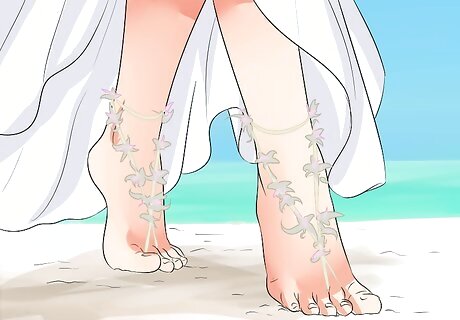
Go barefoot. The easiest way to have a beach wedding is for all parties to go barefoot, and then put your shoes on later, for the reception. If you can't stand the idea of going barefoot, simple, flat sandals are the next best thing. If you do choose to go barefoot, consider laying out a fabric runner along the aisle to protect your feet from hot sand.

Dress male wedding party members in casual clothes. A tuxedo is simply too hot and uncomfortable to wear at a beach wedding. Arrange for the groom, groomsmen, and ushers to wear light, breathable fabrics and save the tux for the reception. Try a lightweight suit made of seersucker, linen, or cotton. Skip formal suits or tuxedos – choose an un constructed style that will be comfortable on the beach. A nicely fitting pair of slacks with a coordinating sport jacket would be appropriate for both groom and groomsmen. Choose colors that match your color scheme, or go with neutral colors such as cream or off-white, almost any shade of blue, or a pale grey. Ties will be uncomfortable in hot weather. Consider dressing up suit or sport jackets with a crisply folded pocket square.

Choose appropriate dresses for the bridesmaids. Because a beach wedding is an informal occasion, the bridesmaids can choose their own dresses or they can wear dresses to match your chosen color scheme. For design coherence, you have three main choices: have your bridesmaids wear matching dresses; let your bridesmaids wear any dress they like; or ask your bridesmaids to choose a style that flatters them, but in your chosen color. Choose lightweight, comfortable fabrics such as cotton, linen, organza, or silk crepe. For a formal beach wedding, select matching dresses in a more traditional silhouette. Sheath dresses are very popular, with a sleeveless or off-the-shoulder neckline. Skirt length can be anything from maxi to mini. For a casual ceremony, bridesmaids can wear almost any style of dress that flatters them. The bohemian look is very popular currently, so you might try babydoll dresses or short, light dresses with halter tops.

Wear sunscreen. Wear a strong sunscreen like SPF 50, and reapply frequently. If you are having your makeup professionally applied, be sure to tell your makeup artist that you need to wear sunscreen. She may have some tips for you, or she may want to use different products that will stay put when applied over sunscreen.
Preparing for the Wedding Ceremony

Hire a wedding planner. If you can afford to hire someone to coordinate your wedding, this is often the best way to go. A professional event planner can usually get discounts on the things you'll need, and will alleviate the stress of arranging every little detail yourself.

Keep the ceremony brief. Beach weather can be unpredictable, and some of your guests may be uncomfortable in the heat. It can also be difficult to hear when it's windy. Plan the exchange of vows to take as little time as possible, and your guests will be grateful for it. Skip long readings or singing performances – save them for the reception instead.

Apply for permits. Whether you are married in the United States or abroad, be sure you are allowed to hold your wedding on the beach of your choice. Check with the local authorities early in the planning stages, and file for the necessary permits well in advance. While you are getting your permit, ask the officials if there are any laws concerning noise levels and how long you're allowed to remain on the beach. National parks are a good choice for a U.S. beach wedding. They are accustomed to holding beach weddings, and will have a clear system of rules and regulations for you to follow.

Arrange for a sound system. Outdoor weddings can be very noisy, so it's a good idea to have a microphone, amp, and speakers available so the guests can hear the couple's vows.

Find a photographer who knows beach weddings. Try to find a photographer who has a lot of experience with beach weddings, because they will know how to find just the right settings and angles. Before hiring a photographer, always check out their portfolio. Most photographers keep an online portfolio showcasing their work at other weddings.

Hire local vendors. If you are having your wedding in an exotic locale, arrange for local companies to manage the food, music and flowers. You could hire professionals in your home town and fly them to your wedding, but that would be very expensive.

Stock up on bug spray. Plan to wear insect repellent, to keep biting bugs away while you say your vows. You might also have a few cans available near the entrance, so your guests can use it, too. Test a small spritz of the bug spray you will be using on an inconspicuous area of your wedding dress. You want to be sure it won't stain your gown.
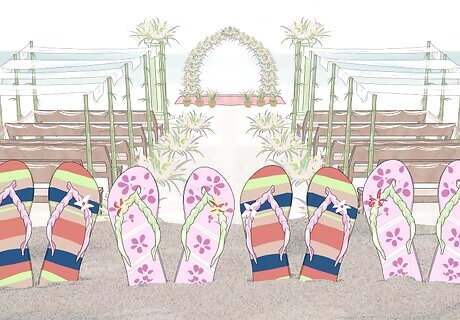
Offer flip-flops for your guests. Set up an area near the entrance of your event where guests can leave their shoes and exchange them for flip-flops. Everyone will be more comfortable, and your guests won't risk destroying their street shoes.



















Comments
0 comment